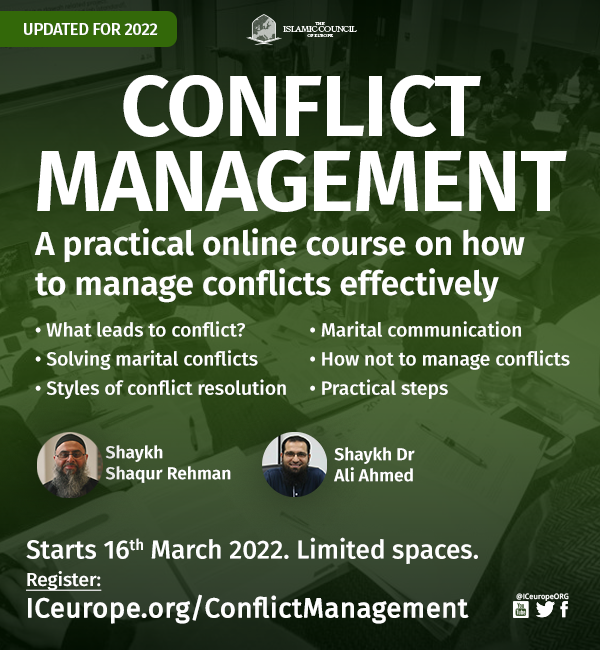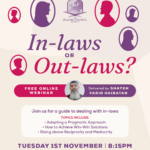By: Shaykh Fuad Abdo & Ustadh Abu Haneefah Sohail
Once the Messenger of Allah (ﷺ) wanted to visit his daughter, Fāṭimah (رضی اللہ عنھا). When he arrived and was welcomed by his beloved daughter, he did not find his cousin and son-in-law, Ali b. Abī Ṭālib (رضی اللہ عنه), in the house. He inquired about his absence and Fāṭimah (رضی اللہ عنھا) informed her beloved father (ﷺ) that they had a dispute in which Ali (رضی اللہ عنه) became annoyed and left the house and has not returned since. Allah’s Messenger (ﷺ) asked a person to find out where he was. After asking around and searching for him, the man came to the Prophet (ﷺ) and informed him that he is sleeping in the Masjid.
Allah’s Messenger (ﷺ) took his leave and went to the Masjid. He found Ali (رضی اللہ عنه) lying down on the floor, his back covered with dust due to his shawl slipping from his back. Allah’s Messenger (ﷺ) began to wipe away the dust from him saying: Get up, Abā Turāb! Get up, Abā Turāb! (Ṣaḥiḥ Muslim 2409).
Family Disputes Happen with Every Family
This story provides an intriguing insight into the household of the Prophet (ﷺ) and his beloved family. Without a doubt, the family of the Prophet (ﷺ) are the most prestigious from this Ummah. We send salutations upon them in every prayer and the protagonists of this story are the three most senior members of the household: the Imam of all the Messengers and leader of Humanity – the Prophet (ﷺ) himself. The leader of the women of Paradise – Fāṭimah al-Zahrā (the radiant). And Ali b. Abī Ṭālib – one of the four rightly guided caliphs and one of the ten who were promised Paradise in their life.
Our first reflection should be that, despite these immense virtues, they were not immune to family disputes. The narration clearly indicates that Ali and Fāṭimah (رضی اللہ عنھما) had some kind of domestic dispute which was upsetting enough for Ali (رضی اللہ عنه) to want to leave his apartment and sleep in the Masjid. If the greatest, most noble, most pious family, all guaranteed paradise in their life, were not immune from domestic disputes then no other family after them will be immune.
Family relationships are intimate and at times intense providing the perfect circumstances for misunderstandings, miscommunications, feelings of hurt and disputes. These disputes should be the exception and not the norm, but nevertheless they do occur and we need to maintain perspectives on them: They are part and parcel of marriage and families need to adopt a mature attitude towards dealing with disputes. So let us analyse the incident in a little more detail and glean some useful life lessons for our own families today.
Disputes Between Husband and Wife Need to be Kept Private
It is a sad reality that it has become a common feature of modern-day family dynamics that when a dispute arises in a marriage both parties will seek allies from close family, friends and even respected members of the community. They do not reach out in order to seek a resolution but in order to fortify their stances with allies and sympathisers. This leads to what initially appears to be a simple dispute escalating into a full-blown marriage crisis. Note that when the Prophet (ﷺ) asked Fāṭimah (رضی اللہ عنها) about Ali’s absence she largely trivialises the dispute by referring to it as ‘shay’ which is the Arabic indefinite article meaning ‘something’. She does not blow it out of proportion, she does not even detail what the specifics of the dispute are. She keeps the matter private even when her father is the Prophet (ﷺ). Considering her father is also the Head of state and the supreme commander of all the Muslims, and she shares a unique and close bond with him, it would have been the ideal opportunity to pour out her grievances and manipulate the situation.
Maintaining Mutual Respect
When Fāṭimah (رضی اللہ عنها) responds to the Prophet’s (ﷺ) question it is interesting that she maintains complete respect for her husband. She describes Ali (رضی اللہ عنه) as being angry with her and not them both being angry with each other. She also describes Ali (رضی اللہ عنه) as choosing not to rest with her as opposed to some statement of mutual anger.
Maintaining complete respect for the husband even at times of disputes is a fundamental pillar of reconciliation. She, of course, was nurtured by the greatest woman in humanity – Khadījah (رضی اللہ عنها) – whose loyalty, respect and commitment to the Prophet (ﷺ) was unwavering. Notice, how when revelation started, the Prophet (ﷺ) hurried to Khadījah (رضی اللہ عنها) and not Abū Bakr (رضی اللہ عنه), despite their close friendship. Notice, how when Khadījah (رضی اللہ عنها) reassured the Prophet (ﷺ) she mentioned some of his great qualities, such as generosity to guests, even though she herself was largely responsible for this generosity as the wealthier partner in the marriage. Notice, how even before Prophethood, when the Messenger of Allah (ﷺ) would seek seclusion for days and even weeks at a time, she did not, on a single occasion, show discontentment to the Prophet (ﷺ). At all times, the Mother of the Believers is selfless in her respect and devotion to the Prophet (ﷺ).
Likewise, this respect is also reciprocated by Ali to Fāṭimah (رضی اللہ عنهما). Some of the most marvelous love poetry we have in our Islamic tradition is from Ali to Fāṭimah (رضی اللہ عنهما). On her passing away, he composed the most eloquent and grief-stricken words of lament, which demonstrated his love and respect for her. An argument or dispute can never be allowed to overshadow love and respect which is built up over years. In their dispute Ali (رضی اللہ عنه) does not go to the seniors of Banū Hāshim to seek allies against his wife but seeks solitude in the house of Allah for an opportunity to dissipate his anger.
The Specifics of a Dispute are Often Irrelevant
Fāṭimah (رضی اللہ عنها) does not mention the specifics of the dispute. The Prophet (ﷺ), upon hearing of the dispute, does not inquire about the specifics of the dispute. Ali (رضی اللہ عنه) does not mention the specifics of the dispute. There is almost a recognition that this is part and parcel of life and marriage. Given enough time and space, married couples, and even business partners, can resolve their disputes where there is a foundation of mutual respect. They also need to ensure they do not aggravate each other further or escalate their disputes through the involvement of others or by opening sensitive wounds which have not yet healed.
Where there is a serious violation of rights the process of reconciliation may require the restoration of these rights but this is the exception not the norm.
The Role of Family and Community Leaders
The Prophet (ﷺ) plays a pivotal role in resolving the dispute and bringing about reconciliation. We need in our families and communities people who have the status, respect and interpersonal skills to bring about resolution to disputes. They are people of the calibre whose mere presence can cause people to return to their senses and act in a dignified manner. We do not need the involvement of people who inflame situations or people who simply do not command sufficient respect to be listened to. This level of credibility requires years to build up and is the inevitable consequence of integrity and leading by example. Note, how effortlessly the Prophet (ﷺ) seeks the return of Ali to the home of Fāṭimah (رضی اللہ عنهما) and affectionately brushes away the dust from his back giving him a new title which became beloved to him – Abū Turāb (nom de guerre: father of dust). The Prophet (ﷺ) refocuses all attention away from the dispute with a simple show of kindness and an expectation that the husband and wife are to be together under the same roof.
Reconciliation
Family breakdown is the greatest threat to our community in modern times. While divorce has always been a feature of family life, even in the time of the Prophet (ﷺ), it was never a cause of complete breakdown between families and trauma to children as it is today. Our communities are vulnerable, and our family units are the basic building blocks of our community. The safety net of a society informed by Islamic principles, or even the support of the wider tribe, no longer exists. We need to look to the example of the Prophet (ﷺ), not just through the prism of ritual acts of worship, but also through the prism of how he conducted himself as a family man, father, husband, community leader and mediator. We need to be those pillars of the community that bring about reconciliation. We need to be those pillars of the community that bring people back to their senses.
We ask Allah to protect and preserve us, our spouses, children, families, the Muslim communities and the entire Muslim Ummah, Ameen!

Next course: Conflict Management
This course will help you proactively manage conflicts to mitigate their impact, thus allowing you to work towards successful relationships













